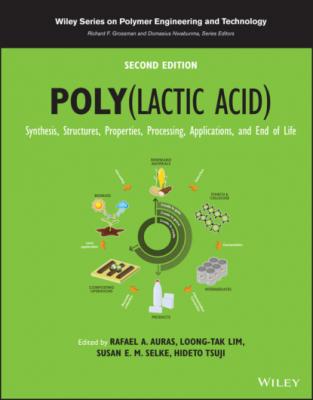Poly(lactic acid). Группа авторов
Читать онлайн.| Название | Poly(lactic acid) |
|---|---|
| Автор произведения | Группа авторов |
| Жанр | Химия |
| Серия | |
| Издательство | Химия |
| Год выпуска | 0 |
| isbn | 9781119767466 |
FIGURE 2.8 Comparison of aqueous lactic acid density calculated using Equations 2.26–2.28 with experimental data of Troupe et al. as a function of apparent wt% and temperature.
FIGURE 2.9 Comparison of viscosity calculated using Equations 2.29–2.31 with experimental data of Troupe et al. as a function of temperature and apparent wt%.
FIGURE 2.10 Comparison of viscosity calculated using Equations 2.29–2.31 with experimental data of Troupe et al.
2.9 SUMMARY
Vapor pressure measurements of anhydrous lactic acid could potentially be affected by oligomerization which produces water. Many vapor pressure measurements are provided by investigators measuring vapor pressure during use of lactic acid in chemical synthesis. Oligomerization of aqueous lactic acid significantly influences optical rotation, bubble temperature, and viscosity. Property measurements of aqueous solutions require careful validation of oligomer equilibration. The titratable acidities of equilibrated aqueous solutions are well represented by the Flory‐Schulz distribution which is a measure of the number of free acid groups in the equilibrated mixture.
REFERENCES
1 1. D. R. Witzke, Introduction to properties, engineering, and prospects of polylactide polymers, Ph.D. thesis, Michigan State University, East Lansing, 1997.
2 2. W. D. Bancroft, H. L. Davis, The optical rotation of lactic acid, J. Phys. Chem. 1931, 35(9), 2508–2529.
3 3. H. Henry, N. Marmy Conus, P. Steenhout, Béguin A, Boulat O., Sensitive determination of d‐lactic acid and l‐lactic acid in urine by high‐performance liquid chromatography‐tandem mass spectrometry: d‐lactic acid and l‐lactic acid in urine, Biomed. Chromatogr. 2012, 26(4), 425–428.
4 4. X. Ding, S. Lin, H. Weng, J. Liang, Separation and determination of the enantiomers of lactic acid and 2‐hydroxyglutaric acid by chiral derivatization combined with gas chromatography and mass spectrometry, J. Sep. Sci. 2018, 41(12), 2576–2584.
5 5. L. Zhang, A. F. Martins, P. Zhao, M. Tieu, D. Esteban‐Gómez, G. T. McCandless, et al., Enantiomeric recognition of d‐ and l‐lactate by CEST with the aid of a paramagnetic shift reagent, J. Am. Chem. Soc. 2017, 139(48), 17431–17437.
6 6. H. Borsook, H. M. Huffman, Y.‐P. Liu, The preparation of crystalline lactic acid, J. Biol. Chem. 1933, 102(2), 449–460.
7 7. V. L. Novikov, O. P. Shestak, Reactions of hydrogen peroxide with acetylacetone and 2‐acetylcyclopentanone, Russ. Chem. Bull. 2013, 62(10), 2171–2190.
8 8. J. Schott, J. Kretzschmar, S. Tsushima, B. Drobot, M. Acker, A. Barkleit, et al., The interaction of Eu(III) with organoborates—a further approach to understand the complexation in the An/Ln(III)–borate system, Dalton Trans. 2015, 44(24), 11095–11108.
9 9. C. T. Bowmer, R. N. Hooftman, A. O. Hanstveit, P. W. M. Venderbosch, N. van der Hoeven, The ecotoxicity and the biodegradability of lactic acid, alkyl lactate esters and lactate salts, Chemosphere 1998, 37(7), 1317–1333.
10 10. K. Masutani, Y. Kimura, Chapter 1. PLA synthesis. From the monomer to the polymer, in: A. Jiménez, M. Peltzer, R. Ruseckaite (Eds.), Polymer Chemistry Series [Internet], Royal Society of Chemistry, Cambridge, 2014 [cited 31 March 2021], pp. 1–36. Available from: http://ebook.rsc.org/?DOI=10.1039/9781782624806‐00001.
11 11. Feng L, X. Bian, Z. Chen, S. Xiang, Y. Liu, B. Sun, et al., Determination of d‐lactide content in lactide stereoisomeric mixture using gas chromatography‐polarimetry, Talanta 2017, 164, 268–274.
12 12. M. Muller, J. Hess, W.‐G. Schnell, G. Entenmann, Meso‐lactide, processes for preparing it and polymers and copolymers produced therefrom, US Patent 4,983,745, 1991.
13 13. H. Rinderknecht, C. Niemann, The esterification of acylated α‐amino acids, J. Am. Chem. Soc. 1948, 70(7), 2605–2606.
14 14. B. Iselin, E. A. Zeller, 196. Über den enzymatischen Abbau von l‐α‐oxysäuren, Helv. Chim. Acta. 1946, 29(6), 1508–1520. https://dx.doi.org/10.1002/hlca.19460290618.
15 15. A. Šepitka, Physical‐technical properties of lactic acid, Pru˚m. Potravin. 1961, 12, 661–665.
16 16. E. Cherbuliez, H. Weniger, 255. Phosphorylations par les acides polyphosphoriques, Helv. Chim. Acta. 1946, 29(6), 2006–2017.
17 17. V. V. Perekalin, A. K. Petryaeva, M. M. Zobacheva, É. L. Metelkina, New method of synthesizing α‐hydroxy and α‐ketoacids, Dokl. Chem. 1966, 166, 217–219.
18 18. V. Ababi, A. Popa, Studiul echilibrului sistemului ternar:
